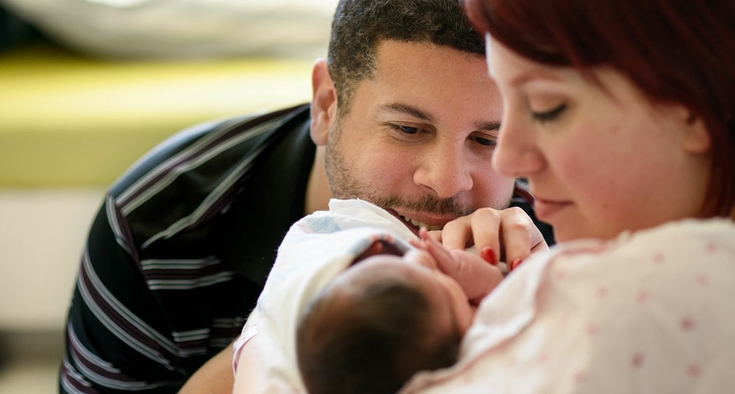Bonding with your new baby at the hopsital is vital. At Novant Health, we create a nurturing, family environment right from the beginning.
That means you'll be "rooming-in," or staying together in the same room unless there's a medical reason either of you needs to receive care separately. Research proves mother and baby do better together.
The concept of rooming-in has been around since childbirth moved out of homes and into hospitals. Rooming in gained popularity in the 1940s when research proved that babies who were cared for in mothers' rooms were less at risk of infections spread in nurseries.
In the 1970s, when birthrates declined, some hospitals marketed childbirth as a "week's vacation" to weary mothers, encouraging mothers to send babies to "state-of-the-art" newborn nurseries. There, nurses — often trained by formula sales representatives — bottle fed babies formula so new mothers would not be interrupted by their babies' feeding routines.
Hospitals are changing to accommodate rooming in. Traditional newborn nurseries, where hospital staff used to care for babies (including feeding, changing, swaddling, holding and rocking), are now newborn observation units, where babies who need it can receive medical care too comprehensive to be delivered in the mother's room. When rooming in, all routine medical care occurs in the mother's room.
Our lactation consultants recommend rooming in because they've seen how well mothers and babies do when they stay together. Babies who room-in cry less, are more calm, more wakeful and their behavior is more consistent. Rooming in allows time for skin-to-skin care with parents, which helps babies thrive. Babies who room in are usually better at breastfeeding than babies who are separated from their parents.
Mothers who room in are calmer and more confident, thanks in part to oxytocin, a hormone produced when a mother is with her baby. Previous generations, who did not know the role of oxytocin in motherhood, thought they were helping mothers by taking her baby and allowing her to get some rest. New research tells us when mothers are without their babies, they produce less oxytocin and therefore experience fewer of the good physical and emotional responses oxytocin brings, such as increased breast milk and decreased cortisol (a hormone that causes stress).
Birth is an exciting, emotional time that is as stressful for babies as it is for mothers. While it may seem tempting to send your baby to the nursery, remember that after a long, exhausting day, everyone needs to be comforted...together.
Childbirth is unpredictable — but thinking through your preferences ahead of time can make you feel more confident on the day of. Download out our birth preparation guide.






